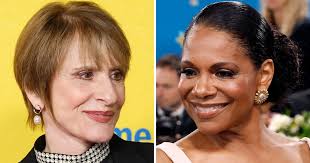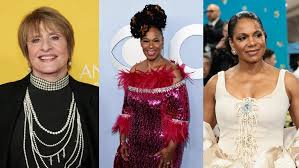In the world of Broadway, where standing ovations echo and talent reigns supreme, few names command the respect and admiration that Audra McDonald and Patti LuPone have earned. With decades of performances, countless accolades, and a legacy etched into American theater history, both women are revered not only for their voices but for their uncompromising dedication to the craft.
Yet behind the velvet curtain, not all is harmony.
A recent profile of Patti LuPone in The New Yorker, published May 26, peeled back a layer of civility to reveal a long-standing estrangement between the two iconic performers. While McDonald responded with grace and restraint in a preview of a June 3 interview on CBS Mornings, LuPone’s words were unmistakably pointed—and have since stirred conversations both within and beyond the theater community.
In the New Yorker piece, writer Michael Schulman asked LuPone, 76, about her relationship with McDonald, 54—specifically referencing McDonald’s public support of a social media post accusing LuPone of racial microaggressions. Instead of sidestepping the question, LuPone chose to confront it head-on, albeit with brevity.
“I thought, ‘You should know better,’” she said. “That’s typical of Audra. She’s not a friend.”
For anyone unfamiliar with their history, this might seem like a simple falling-out between two industry professionals. But for theater insiders and fans alike, the declaration was jarring. The two women have shared stages, mutual respect from the industry, and once seemed part of a tight-knit group of trailblazing women in musical theater.
So what happened?
LuPone declined to elaborate further in the article. When Schulman attempted to pivot to McDonald’s current starring role in Gypsy, a musical for which LuPone won a Tony in 2008, the response was even more telling:
“She stared at me, in silence, for 15 seconds,” Schulman wrote. “Then she turned to the window and sighed, ‘What a beautiful day.’”
The silence—and the sigh—spoke volumes.
When CBS Mornings co-host Gayle King asked McDonald about LuPone’s comments during a preview segment released May 29, McDonald handled the moment with the dignity that has long characterized both her stage presence and public persona.
“That’s something you’d have to ask Patti about,” she said. “I haven’t seen her in about 11 years just because we’ve been busy just with life and stuff. So, I don’t know what rift she’s talking about, but you’d have to ask her.”
In a world where celebrity feuds often play out on social media in dramatic and sometimes petty exchanges, McDonald’s measured response was notable. She didn’t deny the possibility of distance between them, but she also refrained from offering counter-accusations or stoking the fire.
It’s a striking example of how public figures—especially women of color—are often expected to defend themselves gracefully in the face of loaded commentary, even when the implication is hurtful.

Both LuPone and McDonald are theatrical titans in their own right, albeit with very different styles and career arcs.
Patti LuPone is known for her powerhouse performances, commanding stage presence, and unfiltered honesty. She made her Broadway debut in the 1970s and gained fame with iconic roles in Evita, Gypsy, and Company. Her voice—both figuratively and literally—has long defined her. She’s brash, bold, and beloved for being a truth-teller, even when that truth is uncomfortable.
Audra McDonald, by contrast, exudes precision, elegance, and emotional depth. With six Tony Awards, she holds the record for the most performance wins of any actor in Tony history. Her career spans musicals, operas, concerts, and dramatic plays. From Ragtime to Carousel to Lady Day at Emerson’s Bar and Grill, McDonald’s work is often rooted in empathy and technical mastery.
Both women have had overlapping paths. They co-starred in the 2000 concert version of Sweeney Todd and again in the 2007 LA Opera production of Rise and Fall of the City of Mahagonny. At the time, fans delighted in the pairing of these two stage giants—each so different, yet equally electrifying.
But time, careers, and perhaps personal experiences have seemingly driven a wedge between them.
McDonald is currently starring as Rose in Gypsy at a major regional theater, a role considered one of the most challenging and coveted in musical theater. Rose—often dubbed “the King Lear of musical roles”—is a fierce, flawed, and formidable stage mother, brought to life with searing intensity by LuPone in her Tony-winning 2008 revival.
That McDonald is tackling the same role now, and earning rave reviews and a Tony nomination in the process, has added an extra layer to the narrative. Comparisons between the two portrayals are inevitable, and some have wondered whether LuPone’s remarks stem partially from creative or professional competitiveness.
If McDonald feels any of that, she hasn’t shown it publicly. Instead, she continues to focus on her craft, bringing her own interpretation to a character that has haunted and inspired actresses for decades.
While LuPone’s comments may appear to be personal, they don’t exist in a vacuum. The broader context includes ongoing discussions in the performing arts community about race, representation, and accountability—topics that have gained urgency in recent years.
The social media post that McDonald reportedly supported referenced accusations of racial insensitivity involving LuPone. While the details of that post have not been widely publicized, its mere mention raises important questions: What happens when beloved figures in the arts are called out? How do we balance accountability with legacy? And how do peers navigate those complex moments, especially across racial lines?
McDonald, as a Black woman in an industry that has historically marginalized people of color, has long used her platform to advocate for equity and inclusion. She’s been involved in initiatives like Black Theatre United and has spoken candidly about the need for systemic change in theater.
LuPone, meanwhile, has also been outspoken—sometimes to her detriment. Her passion for the stage is unmatched, but it can sometimes read as brusque or dismissive, particularly in conversations that require sensitivity around identity and race.

That’s not to say LuPone’s criticisms are inherently racist or unjustified. But in a climate where silence or sarcasm can feel like complicity, McDonald’s quiet but firm support of those raising concerns may have created a philosophical—or personal—divide.
Perhaps the most telling element in this story is what remains unsaid.
Neither McDonald nor LuPone has publicly explained the origins of their “rift.” Was it a misunderstanding? A professional slight? Or something deeper rooted in values or miscommunication?
In her interview with CBS Mornings, McDonald seemed genuinely perplexed, saying, “I don’t know what rift she’s talking about.”
That suggests either a difference in perspective—or a deeper hurt that hasn’t been addressed. And in the performing arts, where collaboration is often intense and intimate, those unspoken tensions can linger for years.
The real story here might not be about rivalry at all. Instead, it’s a meditation on two women who have, in their own ways, shaped American theater—who have broken barriers, pushed limits, and demanded excellence.
It’s also a reminder that not all relationships in the spotlight are meant to last. Creative partnerships, like any other, are vulnerable to time, change, and friction.
But that doesn’t negate the beauty of what once was—or what each continues to achieve.
As McDonald awaits the outcome of the 2024 Tony Awards on June 8, where she’s nominated for her role in Gypsy, and as LuPone continues her evolution as a stage and screen presence (most recently appearing in Marvel’s Agatha All Along), it’s clear that both women are still very much forces to be reckoned with.

Whatever the personal distance between them, their contributions remain enduring, their legacies secure.
And in theater—as in life—not all stories resolve cleanly. Some end with a song, a sigh, or simply a shift in the light.
Postscript:
The full CBS Mornings interview with Audra McDonald airs on June 3, 2025, where she may share more reflections on her career, her work in Gypsy, and her perspective on this quietly unfolding chapter. Whether reconciliation is on the horizon or not, one thing remains certain: Broadway is big enough for both of their brilliance.










